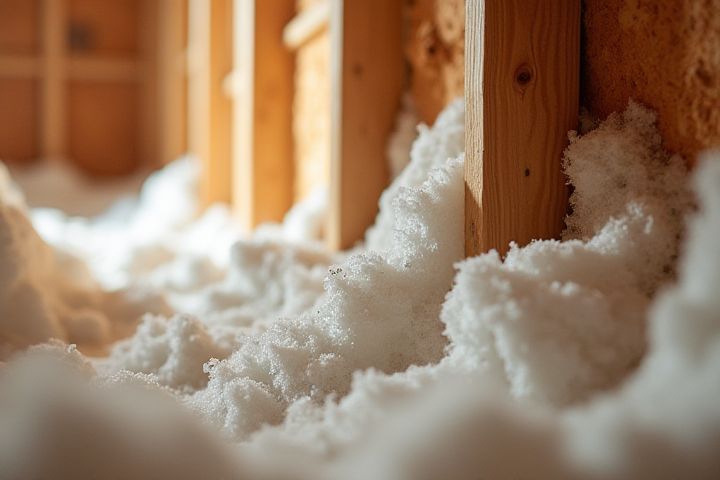
Good insulation is essential for a house because it significantly improves energy efficiency, helping to maintain a comfortable indoor temperature regardless of external weather conditions. High-quality insulation minimizes heat loss during winter and reduces heat gain in summer, leading to lower energy bills and a smaller carbon footprint. It also enhances indoor air quality by reducing the infiltration of dust, pollen, and other pollutants from outside. Furthermore, proper insulation can help prevent moisture buildup, decreasing the risk of mold growth and structural damage. Investing in good insulation ultimately increases the overall comfort and value of your home.
Why A House Needs Good Insulation
Energy efficiency
Good insulation is crucial for energy efficiency as it significantly reduces heat transfer, helping maintain a comfortable indoor temperature year-round. Proper insulation minimizes the need for excessive heating in winter and cooling in summer, leading to lower energy bills and reduced carbon footprint. By effectively sealing gaps and preventing air leaks, insulation enhances the overall performance of your heating and cooling systems, ensuring they operate efficiently. Investing in quality insulation not only benefits your wallet but also contributes to sustainable living by conserving energy resources.
Cost savings
Good insulation in your house significantly reduces energy consumption, leading to lower utility bills. According to the U.S. Department of Energy, proper insulation can save homeowners up to 20% on heating and cooling costs each year. For a typical household, this can translate to annual savings of $200 to $400, depending on the size of the home and local energy rates. Investing in quality insulation not only enhances comfort but also provides substantial long-term financial benefits, making it a smart choice for any homeowner.
Temperature regulation
Good insulation is essential for effective temperature regulation in a house, as it significantly reduces heat loss during winter and heat gain in summer. By minimizing the transfer of thermal energy between the interior and exterior, insulation maintains a consistent indoor climate, enhancing your comfort level. This efficiency not only contributes to a more pleasant living space but also leads to lower energy bills, as your heating and cooling systems can operate less frequently. Investing in quality insulation can drastically improve your home's energy efficiency and overall value.
Noise reduction
Good insulation plays a crucial role in noise reduction within a house, creating a quieter and more comfortable living environment. Effective insulation materials, such as fiberglass, foam, and cellulose, absorb sound waves and prevent them from traveling between rooms or from the outside. This noise barrier improves your overall quality of life by minimizing disturbances from traffic, neighbors, or other external factors. By investing in high-quality insulation, you enhance your home's acoustic performance, leading to a more peaceful atmosphere that can positively impact your well-being.
Environmental impact
Good insulation in a house significantly reduces energy consumption, thus lowering carbon emissions associated with heating and cooling. By minimizing the demand for heating systems in winter and air conditioning in summer, well-insulated homes contribute to decreased reliance on fossil fuels, which are major contributors to global warming. Improved insulation also enhances indoor air quality by preventing moisture buildup, leading to less need for chemical-based air fresheners and heating elements that can release harmful pollutants. Investing in quality insulation not only leads to lower energy bills for you but also promotes a more sustainable environment for future generations.
Moisture control
Good insulation is essential for moisture control in your home, as it significantly reduces the risk of mold and mildew growth. Effective insulation can maintain indoor humidity levels between 30% and 50%, which is ideal for preventing moisture buildup. Without proper insulation, temperatures can fluctuate, leading to condensation on surfaces like walls and windows, potentially causing long-term structural damage. Investing in quality insulation not only enhances comfort but can also save you up to 20% on energy bills by ensuring that heating and cooling systems work efficiently.
Health benefits
A house with good insulation maintains a consistent indoor temperature, promoting comfort and reducing the risk of respiratory issues related to drafts and humidity fluctuations. Effective insulation can decrease the presence of allergens such as mold and dust mites, leading to improved air quality for you and your family. Moreover, it minimizes exposure to temperature extremes, which can help prevent stress on the immune system. Research indicates that homes with proper insulation can lower energy-related health risks, contributing to better overall well-being.
Increased property value
Good insulation significantly enhances your property's value by improving energy efficiency and reducing utility bills. Potential buyers often prioritize homes with effective insulation, as it translates to lower heating and cooling costs. Properties with superior insulation maintain stable indoor temperatures, increasing comfort and reducing wear on HVAC systems. Investing in quality insulation not only makes your home more appealing but also positions it as a financially smart choice for future owners.
Comfort enhancement
Good insulation significantly enhances comfort in your home by maintaining a consistent indoor temperature, preventing drafts, and minimizing outside noise. With proper insulation, you can reduce temperature fluctuations by up to 30%, resulting in a cozy environment year-round. Insulated walls and attics can also lower your heating and cooling costs by helping your HVAC system operate more efficiently, saving you up to 20% on energy bills. By investing in quality insulation, you prioritize your comfort and create a tranquil living space for you and your family.
Longevity of the structure
Good insulation plays a crucial role in the longevity of your home's structure by maintaining stable indoor temperatures and minimizing moisture accumulation. Effective insulation can reduce the risk of mold growth, which can compromise the integrity of building materials over time. In fact, homes with proper insulation can reduce energy costs by up to 30%, leading to less wear and tear on HVAC systems. By investing in quality insulation, you contribute to the durability of your home, ultimately extending its lifespan significantly.
